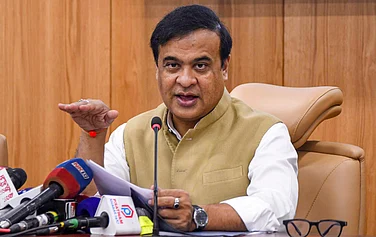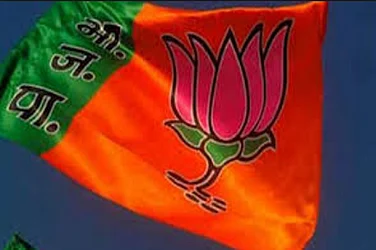The Temple Of A Growth Model
On October 23, the bhumi puja for a new temple will be conducted in Meerut. Five acres of land has already been purchased for the temple, which will feature a 100-foot statue of the presiding deity, Narendra Modi.
“I am inspired by the love Narendra Modiji has for India,” explains J.P. Singh, a retired assistant engineer in the irrigation department, who describes himself as a “follower and supporter” of this murti. “Modi magic deserves that a temple be built which will also be a kind of commemoration of Modiji’s model of development,” he says. Singh was also reported as saying that the project, with an estimated cost of Rs 10 crore, will be funded through public donations and will take two years to complete.

Miracle Mom Denied Entry To Middle Kingdom
She earned her first medal at the age of 93 at the 2009 Chandigarh State Veterans Athletics Championship, and went on to make waves when she became the world’s fastest centenarian at the American Masters Games in Vancouver in 2016. But Mann Kaur, 101 and her 79-year-old son, Gurdev Singh, who were hoping to participate in the 20th Asia Masters Athletics Championships in China, have had their visas rejected by the Chinese embassy. Their letter from the Masters Athletics Federation of India, alongside visa applications, were deemed insufficient. The embassy required personal invitations from the organisers. This has caused great financial setbacks, by forcing them to cancel tickets and hotel bookings. They now plan to fly to Canada, where Kaur will receive a lifetime achievement award, on October 14.

A Childhood Sacrificed
In Nepal this week, a three-year-old girl will lose her childhood. She will be anointed as the ‘Kumari’ of Kathmandu, a living goddess. She has been selected in accordance with strict criteria, which required her to have a ‘lion’s chest’, a ‘deer’s thighs’, and to demonstrate courage by staying stoical when shown a sacrificed buffalo. She bettered four other girls to attain this high honour. The girl will now leave her family to take up residence in a palatial home, which she will be permitted to leave 13 times annually. She will always be carried outside to be worshipped, as the feet of a goddess may not touch the earth. And she will retire when she starts showing signs of puberty, as all her predecessors have done. She may one day take comfort in the fact that this tradition has been criticised by child rights activists.

Barriers Bowled Out
Rabya, an all-rounder on her college’s cricket team, cannot fail to impress as, burqa-clad, she bats, bowls and fields. A first-year student at the Government Women’s College in Baramulla, northern Kashmir, she explains that she has to dress thus when she plays because “I cannot go against the wishes of my teachers at Darasgah [the school she attends for religious instruction].” The team’s captain, 21-year-old Insha, a star player, says, “The journey has not been smooth. When I walked in my tracks with a cricket bat, people would complain to my father. My family is supportive.” She has also had the support of college authorities, who were so impressed that they created a small practice ground for her. In addition to having led her team to victory in J&K’s inter-university cricket championship this year, she has represented the state at both volleyball and cricket.

The Better Part Of Valour
Manohar Lal Khattar, Haryana’s chief minister, had little choice. Giving in to ministers’ demands for a Diwali gift, the state’s cabinet approved an increase in the limit of the discretionary grants for various posts. The figure for cabinet ministers and the assembly speaker has gone up from Rs 5 crore per annum to Rs 7 crore, whereas ministers of state and the deputy speaker have had their limits increased from Rs 4 crore to Rs 5.5 crore. But MLAs aren’t left out—their salaries and allowances were already increased. Yet, limits for the CM remains at a constant of Rs 40 crore. The government is planning to set up a panel to consider increases in the salaries and pensions of those serving in constitutional commissions.
A Cultural Conflagration
Two giants face off across a contested border, yet each attempts to win the hearts and minds of the other’s citizens in a contest of soft power. And the Chinese are concerned that they are being bested by India. Jiang Jingkui of Peking University said, “...in terms of soft power, India has done better than China...they have put a huge emphasis on promoting their culture.” A glaring example is Dangal, which grossed over $194 million at the Chinese box office, leading Chinese firms to compete for domestic rights to Bollywood films, even to hire Indian writers and directors.
Trucks Run Over Taboos
Clad in a pink saree, she drives her 60-tonne truck across the Thar desert. Gulaban, 25, is a Pakistani Hindu and one of 30 women being trained to drive trucks by the Sindh Engro Coal Mining Company. As the country redoubles its efforts to tackle the energy crisis and economic activity in the border region intensifies, women like Gulaban are taking advantage of the increasing number of jobs available and breaking cultural taboos. Such work may help empower women whose prospects are otherwise dim, hopes Gulaban, a housewife and mother of three who has an advantage over the other trainees as she was the only one who already knew how to drive a car.

A Chief’s Dodgy Return
The re-election of ousted prime minister Nawaz Sharif as the chairman of his party, the Pakistan Muslim League (N) has sparked off a political debate in Pakistan. Many are now raising questions on how much the return of Sharif will hurt the democratic structure of the country.
Sharif had to step down from the prime ministership after a court found him guilty of financial corruption following revelation of the Panama Papers. Though he had to give up the PM’s post, he ensured his trusted lieutenant was elected to the post, replacing him, thus ensuring that power remains within his control.
The government pushed through an amendment in election laws in Pakistan’s parliament, enabling Sharif’s re-election as party chairman. “The controversial amendment may have allowed Sharif to retain leadership of his party, but it has further dented democratic values,” writes Dawn columnist Zahid Hussain.
The amendment is being challenged by some of Sharif’s opponents in the Supreme Court, which is likely to raise questions on how, despite its ruling against the former premier, he managed to get re-elected as PML (N) chairman.
Next week, the accountability commission is due to hear Sharif’s case, so many observers feel his hurried re-election is an attempt to pressurise the commission and the apex court. During a recent byelection in Lahore, which the PML(N) candidate won, Sharif told supporters that theirs was the real verdict on him and his leadership, not the one that led to his ouster.
But Hussain feels the amendment passed in parliament for Sharif sets a bad precedent. “Most worrying is that this person-specific amendment in the law and the manner in which it was railroaded has further eroded democratic norms. Now, anyone condemned by a court of law can form and lead a political party. Ironically, a person barred from holding public office can still be kingmaker and continue to run the government through proxies.”
Hussain points out that apparently the reason behind the hasty passage of the amendment was to bring the courts under pressure. But the move may not work. Instead, it may trigger yet another round of legal battle, as the amendment has already been challenged in the courts.
Crucially, the judiciary enjoys support from the Pakistani army, with a mandate to clean up the system. The unfolding situation in the coming days will tell which of the two controls the levers of power.
Illustrations by Sajith Kumar


























